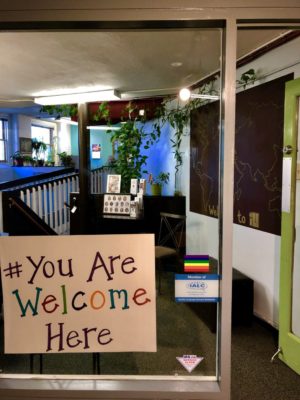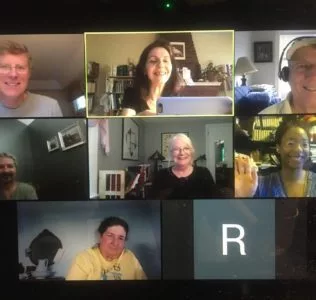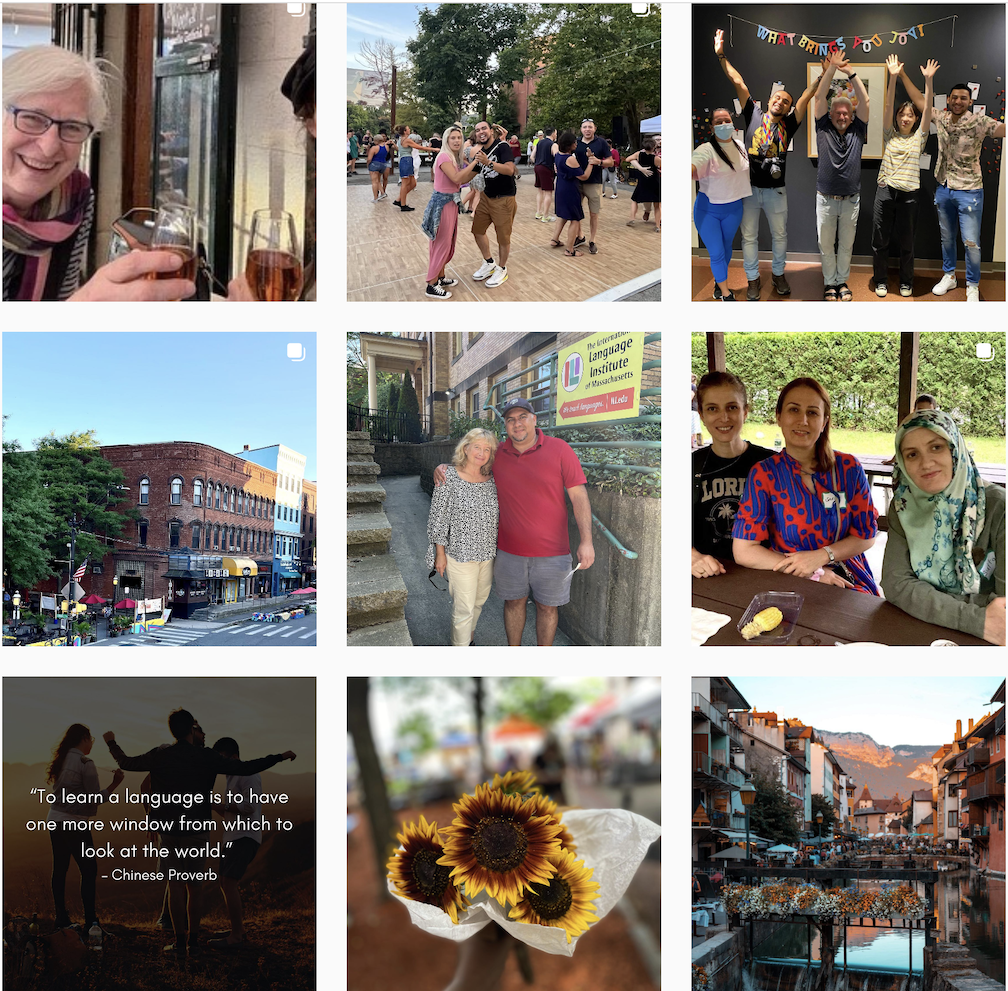 As reported on this blog in mid-June, Professionals in International Education (PIE) chose ILI as one of seven language schools from around the world nominated for the PIEoneer language educator of the year award. In September, PIE will announce the award recipient at a combined in-person/online event from London. No matter the decision, we are honored to be included as one of the nominees—the only one from the United States.
As reported on this blog in mid-June, Professionals in International Education (PIE) chose ILI as one of seven language schools from around the world nominated for the PIEoneer language educator of the year award. In September, PIE will announce the award recipient at a combined in-person/online event from London. No matter the decision, we are honored to be included as one of the nominees—the only one from the United States.
We think the questions and answers on the nomination application provide a good summary of what ILI students, teachers, staff, and community supporters have been up to. Read below.
PIEoneer Language educator of the year nomination application:
In the Language educator of the year category, we [PIE] recognize language providers around the world who are going the extra mile to provide their students with a stand-out experience and an exceptional level of service and those who are innovating the student experience to ensure students develop their language skills and become confident communicators. We will consider providers who are teaching a language to domestic or international students.
Q. Please provide a brief introduction to the organization being nominated to give background context to the entry.
The International Language Institute of Massachusetts (ILI) is more than a language learning center. We are students, teachers, and community supporters who, working together, advance ILI’s mission to promote intercultural understanding and diverse communities through high-quality language instruction and teacher training.
For 38 years, we have celebrated the rich cultural traditions of international and domestic students, and we continuously strengthen our unified aspiration to honor and respect them. As individuals and as an organization, we believe that all of our decisions and actions should stem from grace and loving kindness.
Based on these principles, we offer numerous programs, including free English classes for immigrants and refugees and a number of fee-based courses—the intensive English program for international students; world language studies for people who wish to learn other languages; on-site workplace language learning for employees and employers to help them communicate better with each other and their customers; teacher training through the TESOL certification process; University Pathways for international students seeking to enhance
and refugees and a number of fee-based courses—the intensive English program for international students; world language studies for people who wish to learn other languages; on-site workplace language learning for employees and employers to help them communicate better with each other and their customers; teacher training through the TESOL certification process; University Pathways for international students seeking to enhance
Q. Please provide a 50-word summary of your entry that can be used in our award promotions.
ILI—where innovative, highly skilled teaching creates student-
1. What initiatives did you undertake in 2021 to develop your provision for students and how successful were they?
In 2021, ILI achieved milestones in service delivery to international, immigrant, refugee, and domestic students. Among them:
1. Because of our firm support for students and teachers during the pandemic, enrollment in ILI’s free English classes for immigrants and refugees increased in 2021, a welcome shift from declining numbers in early 2020. Students made significant progress, exceeding the measurable skills gains targets set by our partner, the Massachusetts Department of Elementary and Secondary Education. The department recognized this
2. ILI became the first certified Service Enterprise Organization in western Massachusetts, recognized by Points of Light, an international entity focused
3. Last fall, we reopened our doors to welcome international students for in-person studies in the intensive English program. This reversed a decline in enrollment during the first year of the pandemic.
4. Students in our Spanish, French, and German classes eagerly followed ILI
5. ILI completed a strenuous process to earn a five-year accreditation—highest level—from the Accrediting Council for Continuing Education and Training (recognized by the U.S. Department of Education). This was particularly gratifying because it was the first time the Council bestowed accreditation for online classes.
2. How are you evolving your teaching and learning, considering the impact of the pandemic and advances in digital innovation that are changing the learning landscape?
 Since moving classes online in 2020, ILI has worked to improve remote learning experiences. Many international and domestic students were well versed in computer technology and had the means to shift to online classes. The greatest challenge was to maintain the congeniality and trust level that students developed with each other and their teachers during in-person classes. As one student in ILI’s French classes said, “We are like a family. And we will do all we can to retain that feeling until we can meet again in person.” This type of commitment led to high enrollment levels in ILI’s world language program in 2021.
Since moving classes online in 2020, ILI has worked to improve remote learning experiences. Many international and domestic students were well versed in computer technology and had the means to shift to online classes. The greatest challenge was to maintain the congeniality and trust level that students developed with each other and their teachers during in-person classes. As one student in ILI’s French classes said, “We are like a family. And we will do all we can to retain that feeling until we can meet again in person.” This type of commitment led to high enrollment levels in ILI’s world language program in 2021.
Unfortunately, computer literacy was not a strongpoint for students hit hardest by the pandemic—most immigrants and refugees in ILI’s free English classes. Many lacked adequate
ILI continues to improve onlin
3. What do you do to support and promote the wellbeing and mental health of your students, and how impactful were these initiatives in 2021?
Because the COVID pandemic drastically altered the lives of many ILI students, most dramatically for immigrants and refugees, ILI has strengthened its long-time
We provided online sessions with teachers and ILI’s career/education counselor and can report that the number of sessions increased in 2021. We eased “Zoom anxiety” by printing and mailing class materials and by spending more one-on-one time to address students’ personal issues regarding online meetings. And we dedicated more staff time to link students with local health and social service partners that are best prepared to assist with the traumas and dislocation of life for the most vulnerable students.
While it is challenging to assess precisely how these efforts impacted the lives of students, we know through responses to our efforts that there have been successes. Perhaps most illustrative is the result of our partnership with a local charitable foundation that resulted in direct COVID-relief payments to underserved populations such as immigrants and refugees. Through this partnership, ILI distributed checks to immigrant and refugee students that changed their family circumstances, even if only for a short while. Monthly rent and utility bills were covered, food was acquired, and child-care costs were paid. As one recipient reported, “When I didn’t have enough money to pay the rent, I got the check. It was really really my life saver!! Thank you sooooo much.”
4. How do you support the professional development of your teachers and staff, and what impact did that have in 2021?
Professional development for teachers and staff has been a mainstay of ILI operations since our founding nearly 40 years ago (and also over the past several years for the ILI board of directors). We devote one of our teacher/staff meetings eac
We participate each year in meetings of regional, national, and international organizations that emphasize t
ILI’s experience in providing relevant professi
ILI teachers also wrote a number of short papers related to successes and challenges in the online teaching environment, posted on ILI’s
5. How do you achieve cross-cultural integration amongst your student body and what impact has this had on student experience in 2021? Please include details of what digital means you used to create and connect your student body during the covid pandemic in 2021.
At ILI, we create risk-free environments in our classrooms. We daily engage with international,  immigrant, and refugee students as well as local residents learning other languages. On day one, we strive to envelop students in a safe place where everyone knows they are welcomed and respected and thus can take chances in their expression of the language.
immigrant, and refugee students as well as local residents learning other languages. On day one, we strive to envelop students in a safe place where everyone knows they are welcomed and respected and thus can take chances in their expression of the language.
That said, there is no question we were concerned about moving to online classes and potentially losing the personal connectivity and sense of belonging we work hard to create. In 2021, we continued operational transfor
Through consultation with marketing experts, we increased our targeted social media outreach and saw an increase in our world language program, enrolling not just local English-speaking residents but also people across the country and even in other countries who wanted to learn additional languages. Our one-on-one online tutorials also increased as we strengthened our volunteer tutor program, in part by providing a monthly newsletter via a new dedicated website for volunteers. At monthly “mingles”, students from all four free English classes meet in one Zoom session for structured ice-breakers; this replaces the break-time chats held between in-person classes.
Teachers created weekly newsletters and dedicated websites to keep students informed of classroom schedules and a variety of tools to enhance online learning, We offered tutorials in Google Classroom and other platforms to help achieve this goal.